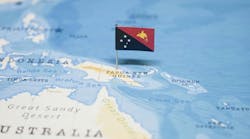The nonbinding memorandum of understanding (MOU) for the $2.5 billion sale of interest in the Leviathan licenses offshore Israel between Noble Energy Inc. and Woodside Petroleum, first reported in December 2012, has been terminated by the companies (OGJ Online, Dec. 3, 2012).
Woodside would have acquired a 25% stake in each of the 349/Racheal and 350/Amit petroleum licenses that contain the field.
Working interests in the Leviathan project will remain Noble Energy, operator, at 39.66%, Delek Drilling 22.67%, Avner Oil Exploration 22.67%, and Ratio Oil Exploration 15%.
Termination rationale
"The plans for development of the Leviathan discovery have significantly changed since we began the search for a partner approximately 2 years ago," explained Charles D. Davidson, Noble chairman and chief executive officer.
"Perhaps the most dramatic changes have been associated with the growth in the regional markets. The emergence of these regional markets, which are accessible through pipeline outlet, has pushed the need for LNG into a later phase of development versus our earlier plans," he said.
Since the start of negotiations, Leviathan partners have made plans to export gas to neighboring Jordan, Egypt, Turkey, and other countries by pipeline from the field after the initial domestic gas phase. Exports of LNG would become the third leg of development and be from a relatively small floating LNG facility as opposed to the earlier-envisaged land-based plant.
Uncertainties were also introduced in 2013 over Israel's gas export policy, and even now the decision to allow Israeli gas to be shipped overseas remains controversial. In addition, Woodside could not get a clear answer from Israeli authorities about the tax treatment of gas exports.
Said Davidson, "While we have not been able to reach a mutually acceptable agreement with Woodside, we continue to move forward with our partners and the Israel government with plans to develop this world-class asset for the benefit of all stakeholders."
Noble said significant progress has been made on the development of Leviathan field following approval of Israel's natural gas export policy, an agreement with Israel's Antitrust Authority, and receipt of the development and production leases for Leviathan.
The company hopes to sanction the initial phase of development at Leviathan by yearend, with the start of production planned for late 2017.
The initial development phase is planned to be a 1.6 bcfd floating production, storage, and offloading system, to provide gas into Israel and surrounding areas. Front-end engineering and design studies are ongoing for the second phase of development at Leviathan.
Woodside perspective
Peter Coleman, Woodside chief executive officer, commented, "While Woodside's commitment to growth is strong, even stronger is our commitment to making disciplined investment decisions."
At the beginning of negotiations, Coleman referred to the project as a potential world-scale, two-train onshore LNG plant fed by gas from the Leviathan field, which had 2C contingent resource of 20 tcf. He said that LNG exports would come after first establishing a domestic project within Israel. The field also contains 34 million bbl of condensate.
The withdrawal from Leviathan follows Woodside's abandonment of plans to build an onshore LNG plant in the Kimberley for the Browse LNG project in favor of an FLNG solution. The company's Greater Sunrise development in the Timor Sea remains stalled and it has not managed to make good on its plans to expand the Pluto LNG project on the Burrup Peninsula.
All of this leaves Woodside short on new projects to continue production growth and heightens speculation about where the company will look now for expansion. Some observers are predicting a move into Papua New Guinea.
